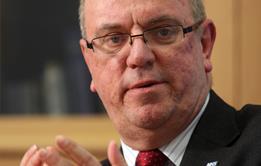The government wanted new competition rules to improve NHS services; senior healthcare leaders say the opposite is happening. A solution is needed quickly
Competition regulators may now be on a par with politicians as the bogeymen most commonly blamed for preventing the NHS making significant changes to services.
Both were targeted by Sir David Nicholson in comments made at HSJ’s Commissioning Summit, but he spoke with the most urgency about the effect of competition rules and regulation.
‘Ministers want competition to be used as a “tool to improve quality for patients”. This is not what we have got’
The NHS England chief executive believes the rules, as they have been applied since April under the Health Act, are preventing changes that would improve quality, and cited four examples from recent weeks.
There is a consensus of concern about this issue among commissioners and most NHS providers, as they find their hard fought schemes being nixed, or delayed into oblivion.
We can see the latest episodes unfold. In Bournemouth and Poole, providers are grappling with the Competition Commission over their proposed merger. In Bristol, Monitor has criticised a swap of several services.
Curious situation
The worry appears to be shared at the top of government. According to Sir David, ministers want competition to be used as a “tool to improve quality for patients”. They appear to agree with him this is not what we have got, and may legislate if necessary.
It is a curious situation and it is hard to see how a reversal of the law won’t be claimed as a victory by those who warned about the effect of the Health Act before it was passed.
‘Damaging rows about the money being used to “plug holes” in local authority budgets − which need plugging − may be inevitable’
Regulatory enforcement of competition and choice was always likely to irritate commissioners and incumbent providers. It entails challenging or at least testing whether their plan is the right one.
The tough new competition rules have, at least, brought about a sharp realisation that change proposals must be backed with strong evidence that they will benefit patients and the public from the outset. Change will surely be more successful if this principle − and meaningful public engagement − is taken to heart.
But there is an immediate practical problem: the summit heard in stark terms about the impact of pooling at least a further £1.9bn of NHS funds with local government, as is planned for 2015-16.
Damaging rows
There is concern about how this money will be managed. If successful, a national approval process will press rapid development of those health and wellbeing boards that are still not up to standard and, more importantly, create conditions for better relationships.
Without these, damaging rows about the money being used to “plug holes” in local authority budgets − which need plugging − are inevitable.
‘Sir David believes commissioners will need to “save the NHS” by leading large scale changes to services’
More alarming though, it is clear that if this money is to be delivered − whether to social care or to bolster community health services − it will mean serious cuts to hospitals.
Another very senior healthcare leader at HSJ’s event stressed that he was concerned the efficiency gains and service change needed to enable those cuts to be made safely could not be achieved in time.
Sir David believes commissioners, in the face of these finances, will need to “save the NHS” by leading large scale changes to services. In contrast “incremental change” and over-regulation would see the end of a free universal health service.
Clear process
So a way around the barriers to service change presented by, or at least blamed on, competition law needs to come quickly.
It may mean legislation, or regulators improving their approach to, and expertise in, health.
It may mean better planning and engagement by the NHS, and a clear process for regulators to be involved earlier in service planning, setting out their likely requirements.
Whether competition rules remain in their current form or not, the controversy highlights the need for a rapid consensus and framework for how major service change is led, clarifying roles and processes
Exclusive: Competition rules hold back quality, says Nicholson

NHS England’s chief executive has said the government may need to change the law because competition rules are standing in the way of improvements to NHS services.
- 1
- 2
 Currently
reading
Currently
reading
Rapid resolution needed for service change impasse































3 Readers' comments